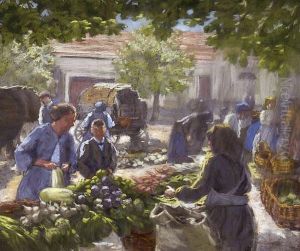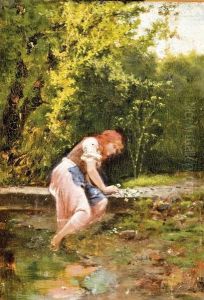Akos Garay Paintings
Ákos Garay was a Hungarian poet and translator, whose contributions to the Hungarian literature and cultural life were significant in the 19th century. Born on January 6, 1809, in Zemplén County, part of the then Kingdom of Hungary, Garay's early life was marked by his family's modest background. Despite the financial constraints, he managed to pursue his education and showed an early inclination towards literature and poetry. His literary career began in the 1820s when Hungary was experiencing a cultural revival, seeking to establish a distinct Hungarian literary and cultural identity amidst the diverse Austro-Hungarian Empire.
Garay's works are characterized by his use of the Hungarian language, at a time when the country was striving to revive and promote its language and literature. He was deeply influenced by the national romantic movement, which sought to inspire a sense of national pride and identity through art, literature, and folklore. Garay's poetry often reflected themes of love, nature, and patriotism, resonating with the Hungarian people's aspirations and struggles during a period of significant social and political changes.
In addition to his poetic endeavors, Garay was also a skilled translator, bringing works of foreign literature into the Hungarian language, thereby enriching the country's literary landscape. His translations helped to introduce Hungarian readers to a wider range of literary genres and themes, contributing to the broader cultural awakening of the nation.
Tragically, Garay's life was cut short when he died on November 7, 1853, at the age of 44. Despite his relatively brief career, his impact on Hungarian literature and culture was profound. Garay's works continue to be celebrated for their lyrical beauty, emotional depth, and patriotic fervor. He remains a pivotal figure in Hungary's 19th-century literary history, embodying the spirit of the national romantic movement and the quest for cultural and linguistic affirmation.


